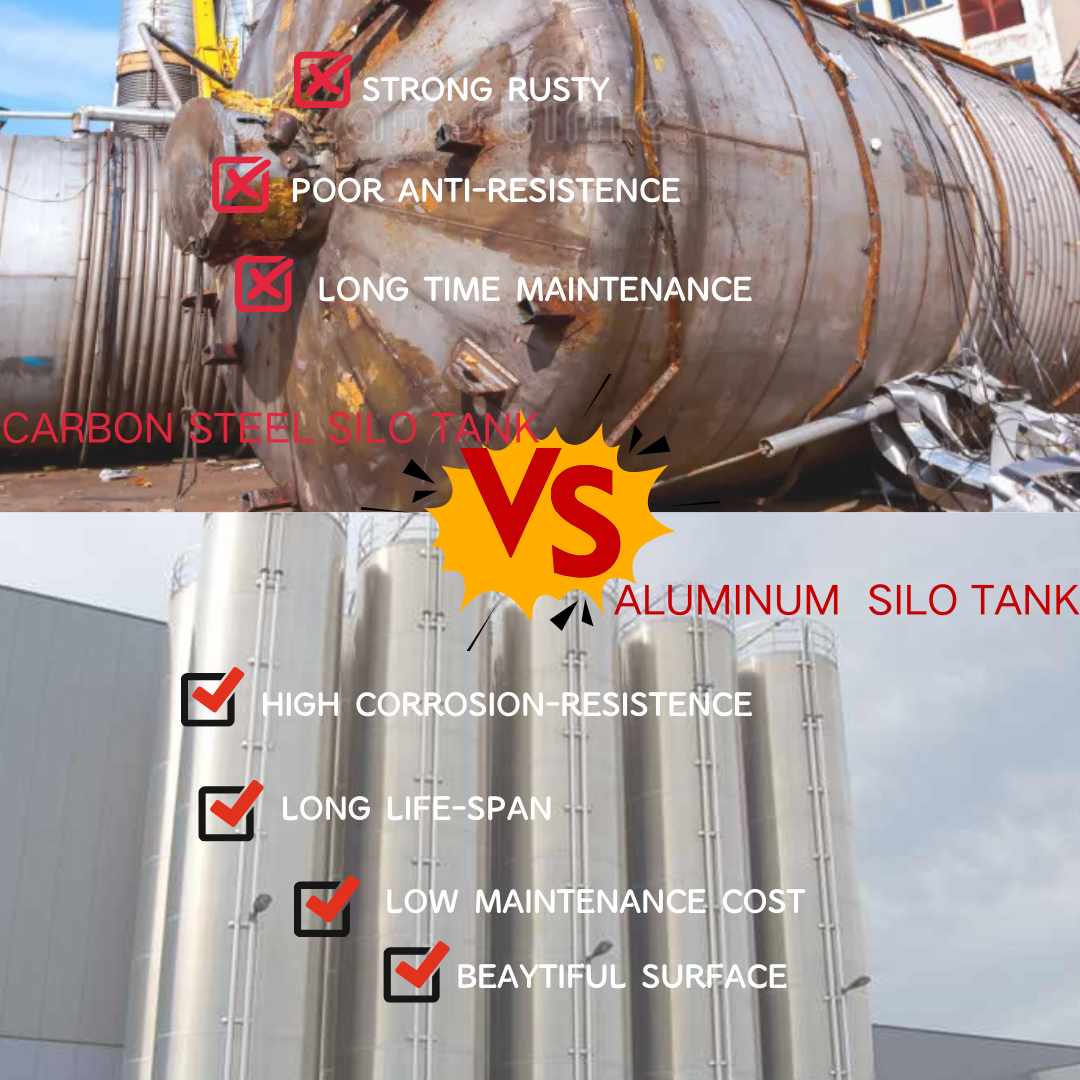STEEL STEEL VER vs Aluminum Alloy - Mokhoa oa ho khetha tse loketseng hantle?

Li-silos li bohlokoa bakeng sa ho boloka thepa ea bongata joalo ka lijo-thollo, ho fepa le lisebelisoa tsa indasteri.
Ho khetha boitsebiso bo nepahetseng ho ikokobelletsa matla a bona ka ho toba, Lifestan, polokeho ea sehlahisoa,
le katleho ea litšenyehelo tsa theko. Har'a likhetho tse fumanehang, tšepe e bonolo le aluminium e bonolo ke likhetho tse peli tse tummeng.
1. Li-Siloel tse bonolo tsa tšepe ke eng?
Boitsebiso bo bohlokoa: Ba entsoe haholo ka seluma se bonolo sa tšepe (litaba tse tlase tsa carbon). Limaraka tse tloaelehileng li kenyelletsa Q235b
(China) kapa a36 (machabeng).
Ka linako tse ling e le ho ntlafatsa ho hanyetsa, bokaholimo hangata bo tšoaroa, joalo ka ho chesa ho chesa ho chesa
(ho theha tšepe e halikiloeng) kapa e koahetsoeng.
E sebetsang ea li-siloel tse bobebe tsa tšepe:
Tokoloho ea Temo: E loketse bakeng sa libuka tse kholo tsa poone, koro, soya. Sebetsana le meroalo e boima.
Fepa mill: Stores Pellet e fepa, metsoako e phofshoana.
Kaho / indasteri: Ho tšoasa litollo, ho fofa molora, phofo ea liminerale.
Lik'hemik'hale tse ling: E loketse li-granules tsa lik'hemik'hale kapa li-corerders tsa lik'hemik'hale.
2. Aluminum alloy e joang?
Boitsebiso bo ka sehloohong: ho atsoa ho sebelisa lishiti tsa aluminium allow. Tloaelehileng Alloy 5052, 5754, 5083.
Li-alloys tsena li boloka boima ba 'mele ba Auminium le kharanta ea tlhophiso ea tlhaho ha e ntse e matlafatsa matla.
E sebetsang ea li-aluminium li-silony:
Libaka tse khutsitseng: E loketse manyolo, letsoai, lik'hemik'hale, kapa libaka tse lebopong le lebopong.
Lijo le Pharma: Bo-ramareme ba boreleli, ba hloekisang ba hloekisang ba hana libaktheria, ba kopana le melao e matla ea tsoekere bakeng sa tsoekere.
phofo, litlatsetso, meriana.
Litlhoko tse bobebe: tse kholo ha boima bo bohlokoa - joalo ka li-silos kapa libaka tse nang le metheo e fokolang.
Indasteri ea ho bōpa: Lits'oants'o tse lumellanang tsa majoe, 'mala oa hae.
3. Melemo ea li-siloel tse bonolo tsa tšepe
Bohlokoa bo boholo bakeng sa chelete: Litsenyehelo tsa thepa le tsa tlhahiso li tlase haholo ho feta aluminium.
Matla a phahametseng: o matla haholo tlas'a khatello le khatello, o tšoere mojaro o boima haholo.
E loketseng polokelo e kholo.
Ho bonolo ho haha: likhoele tse bonolo tsa tšepe, li-cunete le litselana li sebelisa mekhoa e tloaelehileng habonolo, e netefalitsoeng.
Sebelisa ka mokhoa o pharaletseng: Tharollo e netefalitsoeng ea lijo-thollo, li fepa, thepa ea kaho, thepa ea kaho le meqolo e mengata ea indasteri moo
Corsusa ha se taba e kholo.
4. Meeli ea Silo ea tšepe e bonolo
Mafome a bonolo a mafome: ho bonolo ho oela mongobo le lik'hemik'hale. Le ho otla ha ho hahlatsa ho ka khathatsa.
Haeba ho koahela koae ho oela sieo, bophelo ba tšebeletso bo tla khutsufatsoa.
Ho boima haholo: boima ba tšepe ba tšepe bo etsa hore ho be thata, ho phahamisa le ho kenya ts'ebetsong.
Bohloeki bo botle ba bohloeki: Ho hateloa ho thata kapa ho senyeha ha li-calgione ho ka beha likotsi.
Eseng khetho e holimo ea lijo / li-pharma tse thata.
E hloka ho lokisoa: E hloka tlhahlobo khafetsa le ho ama (pente, ho lokisa liaparo tse senyehileng)
ho thibela mafome le ho tsamaisa bophelo.
5. Melemo ea aluminium alloy Silos
Khanyetso e metle haholo ea mafome: e theha karolo e sireletsang ea tlhaho, e loanang le boemo ba leholimo, leholimo le fafatsa.
le lik'hemik'hale tse ngata. E tšoaretse nako e telele haholo, haholo maemong a thata.
Lightweight: e bobebe haholo ho feta tšepe (hoo e ka bang 1/3 boima). Bonolo ebile e theko e tlaase ho tsamaea le ho kenya.
Bohloeki bo holimo: e boreleli, e se nang chefo ha e na liphokojoe. Ho bonolo ho e hloekisa le ho hlohlelletsa.
E loketseng lijo / pharma.
UpKep: e hloka hoo e ka bang ho lokisoa ka thibelo ea litlolo. Boholo ba ho hloekisa feela.
Bokaholimo bo botle: Khanya ea tšepe ea tšepe e lula e khahla ka nako.
6. Meeli ea Aluminium Allows
Litšenyehelo Tse Phahameng: Lisebelisoa tse phahameng tsa Aluminium le Wedding tse ikhethang li theko e boima haholo.
Bohle ba softhara: e halikiloeng habonolo kapa e ka ba e sa reng letho ka ho sebetsana kapa ho sebetsana le eona kapa ho e sebelisa.
Tricky Welding: e hloka tsebo le lisebelisoa tse ikhethileng tsa ho qoba matheba a fokolang ka har'a welds.
7. Khetho ea senotlolo: tšepe e bonolo kapa aluminium e bonolo?
Ha ho na thepa e "ileng "e monate. Khetho e nepahetseng e itšetlehile ka litlhoko tse khethehileng tsa morero.
Seei se bonolo ke khetho e ngata le e sebetsang, haholo-holo e loketseng bakeng sa ho boloka thepa e tloaelehileng e kang
lijo-thollo, li fepa, samente le liminerale.
Ha tekanyetso ea hau e lekantsoe 'me u hloka sebopeho sa Silo e nang le matla a maholo a ho amella haholo
le mojaro o boima, tšepe ea carbon ke khetho e ntle.
Bakeng sa aluminium
kapa sebaka se silafetseng indasteri, khatiso e ntle e kholo ea aluminium alloy e bohlokoa.
Ho feta moo, lits'ebelisong tse nang le litlhoko tse phahameng haholo (tse kang ho boloka lijo, meriana
kapa lihlahisoa tsa boleng bo holimo), aluminium alloy ke lintho tse ratoang haholo.
8.FAQ
Q: Na tšepe e bobebe le aluminium thepa feela ea silo?
A: Che. Letlapa le se nang thuso (le letle empa u ka theko e nepahetseng
.
Q: Ke tla kotula silo e bonolo ea tšepe ea mafome ka botlalo?
A: Ha e netefatsoe ka ho sa feleng. Ho itela ho sireletsa letlapa.
Ha nako e ntse e tsamaea, kapa haeba e senyehile (matsutla, libaka tse ling), mafome a ka qala, haholo-holo maemong a thata.
Ho eketsoa haholo bophelong empa ha se ea ka ho sa feleng.
Q: Na aluminium silos e lokela ho reka litšenyehelo tse phahameng tsa pele?
A: Hangata e, maemong a nepahetseng. Nahana ka litšenyehelo tsohle ka nako ea nako (theko ea potoloho ea bophelo - LCC).
Ha a ntse a theko e boima haholo, aluminium silos e lula e le telele haholo (haholo moo mafome e leng bothata),
e hloka hore ho be le tlhokofatso ea mafome, 'me u sireletse lihlahisoa tse hlokolosi haholoanyane.
Sena se ka boloka chelete ka nako e telele bakeng sa tšebeliso e mpe kapa e kholo e itšetlehileng ka eona.
Q: U etsa hore aluminium e be e matla ka ho lekana?
A: Sebelisa lits'oants'o tse matla (joalo ka 5083), eketsa botenya ba mataoana, ebe o eketsa maemo a bohlale a bohlale joalo
litsie le mehele ea tšehetso. E entsoe hantle, ba sebetsana le mesebetsi e mengata ea ho boloka hantle.
Q: Na nka kopanya likarolo tsa tšepe le aluminium ho Silo e le 'ngoe?
K: Ela hloko haholo! Ha tšepe le aluminium ama maemong a mongobo, li ka baka "bokhabane"
"Moo aluminum corrodes ka potlako. Haeba u tlameha ho ba kopanya (e.g., maoto a tšepe tlasa tanka ea aluminum),
Sebelisa lipampiri tse khethehileng tsa tlhahlobo kapa likatse ho arola tšepe ka botlalo. Fumana likeletso tsa setsebi.
Q: Ke ntho efe ea bohlokoa ka ho fetisisa ha u khetha li-Silo tse bonahalang?
A: Tsepamisa maikutlo ho: Ke eng eo u e bolokang (e phofo? Kereiti ea lijo?),
Moo e leng teng (mongobo? Lebopo la leoatle?
Ke halelele hakae u hloka hore e phele, 'me boholo / litlhoko tsa boima ba' mele.
Sephetho
Tšepe e bonolo le aluminium alloy ke thepa ea mantlha ea li-silos, e 'ngoe le e' ngoe e na le matla a hlakileng a ho tlola.
Tšeho e bonolo e hapa matla le litšenyehelo, e e etsa mokokotlo oa mokokotlo oa thepa e kholo, ea moruo.
Aluminium ALLOVLVLLLLLLLLS E hanyetsanang, boima bo bobebe le bohloeki, e ba khetho e holimo bakeng sa ho ba thata ho feta
tikoloho le litekanyetso tse phahameng.
Senotlolo sa katleho ke ho utloisisa litlhoko tse ikhethileng tsa projeke 'me u li bapise le tse ling
Matla a lintho tse bonahalang, ho fumana ts'ebetso e ntlehali ea ts'ebetso, Lifespan, le litšenyehelo bakeng sa hau.
- 3003 aluminium coil: thepa, likopo le ho reka tataisoHa ho pelaelo














